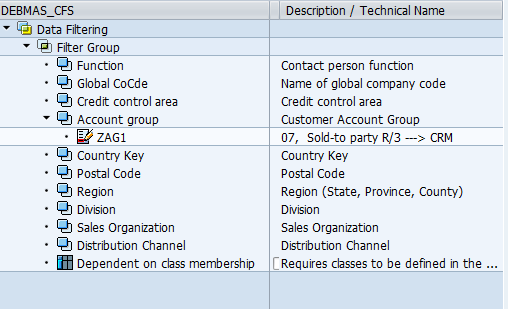
- SAP Community
- Products and Technology
- CRM and Customer Experience
- CRM and CX Blogs by SAP
- C4C - ERP Integration / Data Exchange Filters
- Subscribe to RSS Feed
- Mark as New
- Mark as Read
- Bookmark
- Subscribe
- Printer Friendly Page
- Report Inappropriate Content
In most customers implementations,it is decided that not all data is required to flow from one system to the other. Even if it is technically possible in standard integration.
The general recommendation is to apply all data filters in the middleware. But there are some exceptions of already built filters that we can laverage:
Data Exchange Filters – C4C Outbound
Consideration
All integration decisions in C4C, are controlled in the Business Configuration, there you can decide to integrate Accounts and Contacts uni or bi-directional, prospects and Account Hierarchies.
Apart from that there are not many Integration filters to be applied from C4C out of the box.
Data Exchange Filters – C4C Inbound (From ERP)
Consideration
When going live with a subset of the ERP solution (1 company, 1 sales org) the decision has to be made whether to replicate the entire organizational structure from ERP and whether to send all accounts or a subset of the accounts.
If the decision is made to send a subset of the accounts to C4C, filters will need to be added to either the outbound IDOC configuration or the middleware solution to only include accounts that exist in those org units in scope.
Limitations
The initial set of filters you can apply in ERP (Transaction BD64) are very few, only consider Account Groups, Org units, Channels , Divisions, region, Postal Codes, Contact Person Function, Country Key, Credit Control Area.

Recommendation
Filter in the backend system if :
- Some sensitive records may not go out of the system at all
- It is a Large portion of the data to be filtered out on HCI/PI: Example: Let’s assume ERP has 1,000,000 accounts and only 100,000 are relevant for C4C. In this case it would not make sense to send 1,000,000 IDocs to PI and throw away 90% of them.
Use this if your filter requirements can be fulfilled by the filter objects available in the distribution model
Simple scenarios can be supported this way:
ALE Distribution Model BADI: IDOC_CREATION_CHECK
There is a second BADI that may be used in this context
BADI BDCP_BEFORE_WRITE to prevent change pointers from being written
For both BADIs: Watch out to not to interfere with other ALE integrations at the customer!
If the ERP filters are not sufficient, then other filters can be applied in the middleware.
- SAP Managed Tags:
- SAP Cloud for Customer add-ins
You must be a registered user to add a comment. If you've already registered, sign in. Otherwise, register and sign in.
-
Business Trends
270 -
Business Trends
10 -
chitchat
1 -
customerexperience
1 -
Event Information
256 -
Event Information
17 -
Expert Insights
30 -
Expert Insights
48 -
Life at SAP
133 -
Life at SAP
1 -
Product Updates
666 -
Product Updates
24 -
SAP HANA Service
1 -
SAPHANACloud
1 -
SAPHANAService
1 -
Technology Updates
453 -
Technology Updates
15
- How to Extend Order Integration from SAP Order Management Foundation to SAP S/4HANA in CRM and CX Blogs by SAP
- New Learning Journey - Implement an Integration of SAP S/4HANA Cloud with SAP Commerce Cloud in CRM and CX Blogs by SAP
- SAP and SalesForce Custom Integration flows in CRM and CX Questions
- SAP CDC with SAP Emarsys Customer Engagement - Custom Integrations in CRM and CX Blogs by SAP
- What is planned for the 2402 release of SAP Variant Configuration and Pricing? in CRM and CX Blogs by SAP
| User | Count |
|---|---|
| 4 | |
| 3 | |
| 2 | |
| 2 | |
| 2 | |
| 1 | |
| 1 | |
| 1 | |
| 1 | |
| 1 |